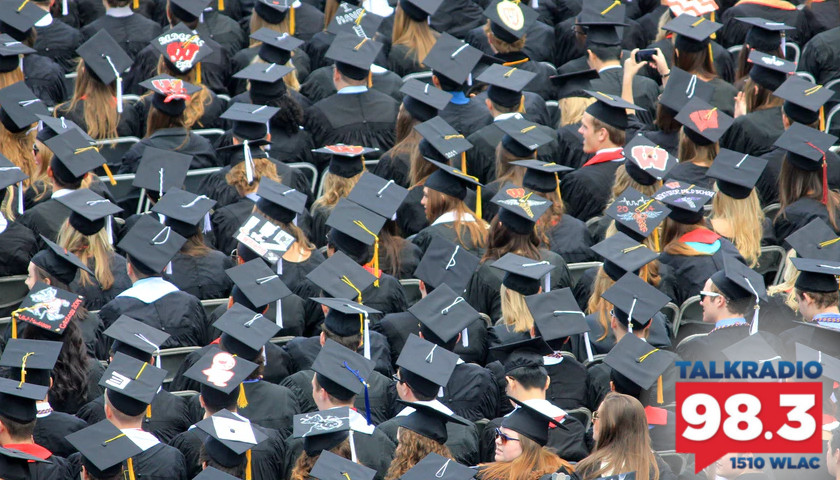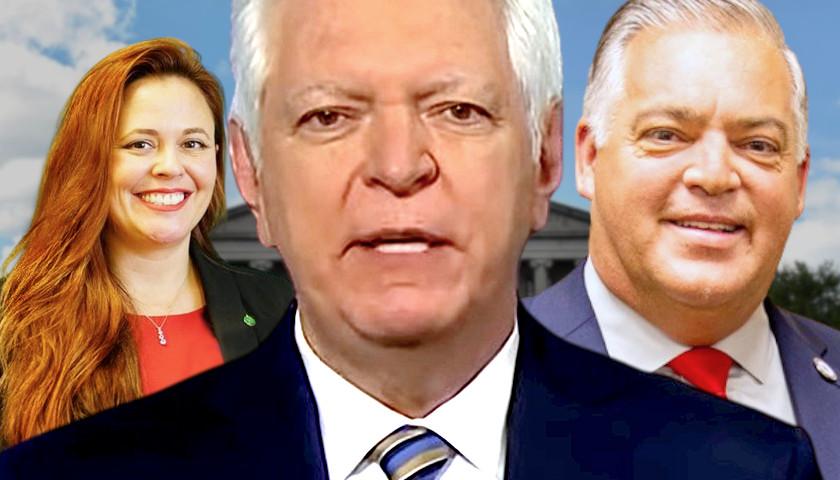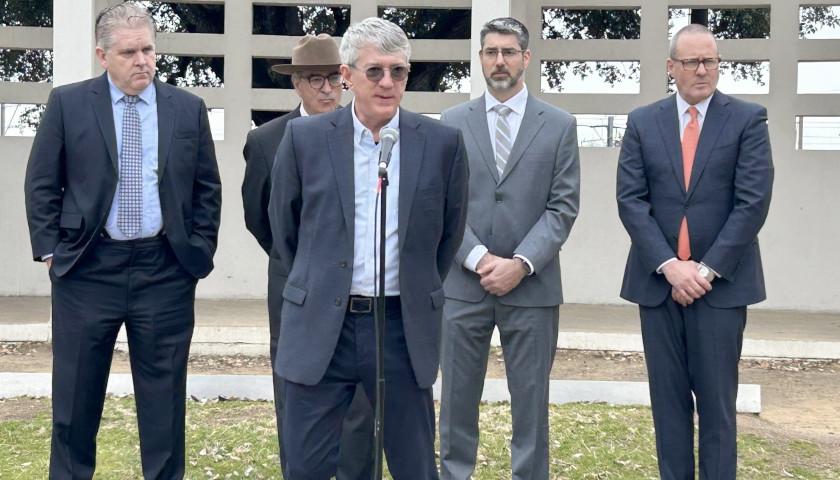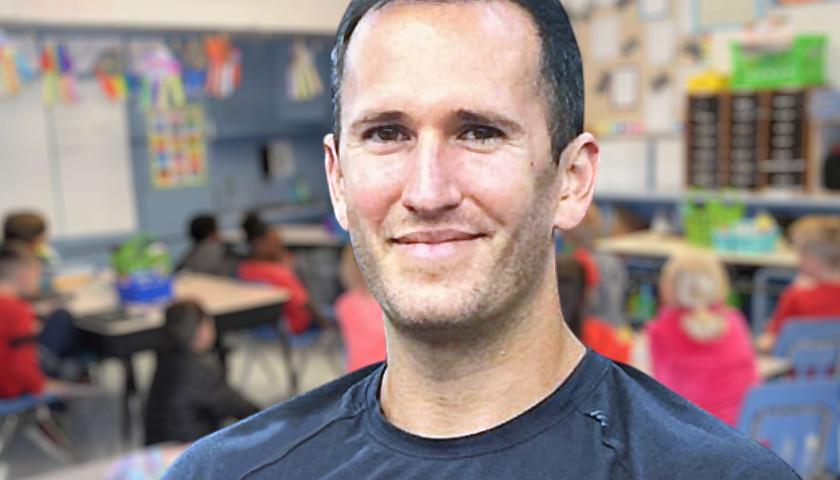Live from Music Row Wednesday morning on The Tennessee Star Report with Michael Patrick Leahy – broadcast on Nashville’s Talk Radio 98.3 and 1510 WLAC weekdays from 5:00 a.m. to 8:00 a.m. – host Leahy welcomed the original all-star panelist Crom Carmichael to the studio to suggest changes to the student loan program.
Leahy: Well, Crom, I just have to say what a delightful interview that was with Professor Philip Hamburger of Columbia Law School.
Carmichael: I would encourage you to go ahead and invite him to come down in October and see if you can get that on the schedule. I do encourage him to bring his wife and make more than one day of it.
Leahy: And when he retires from Columbia Law School he can move his headquarters down here.
Carmichael: Well, he needs to visit first.
Leahy: But he can do that because no state income taxes. I am the biggest promoter of Tennessee. If there’s somebody who we like, we want them to come to Tennessee.
Carmichael: Yes. That’s right.
Leahy: Why wouldn’t they come to Tennessee?
Carmichael: And he’d be a great intellectual addition.
Leahy: Speaking of additions, there are some efforts out there to change the student loan program, which is an utter disaster.
Carmichael: Who’s trying to change it?
Leahy: The various Democrats.
Carmichael: How are they trying to change it?
Leahy: They want to basically forgive half of the loans to people.
Carmichael: So they want to keep making the loans they just want to be able to forgive them.
Leahy: Exactly.
Carmichael: Let’s go back and look at the history of student loan debt. When Obama became president, the student loan program was run by banks. Banks made the student loans.
And what was funny is that banks made the student loans and banks collected the student loans, and they were backed by the federal government. But the banks are the ones who made them and administered them.
Leahy: Administered them.
Carmichael: And collected.
Leahy: Banks are in that business. That’s what they do.
Carmichael: That’s what they do. There was some Democrat committee that was all upset about student loan programs so they called the CEOs of four or five of the biggest banks in the country, which would have been Citibank, Bank of America, Wells, Chase, and maybe another one.
But at least those four. And they demanded to know why they are turning down student loans (Leahy laughs) and why they won’t make a student loan. And it was a female. It might have been Maxine Waters.
Leahy: It probably was.
Carmichael: It probably was. But it said, Madam Congresswoman, or whatever you call her. We haven’t made a student loan in six years since the Obama administration took over the student loan business. (Leahy chuckles)
And our bank hasn’t. And all four of them said we haven’t made a student loan because we can’t. It’s not allowed. So at any rate, let’s look at what the results are. We’re only talking about now eight or nine years since the federal government took over making student loans.
Leahy: I have a sense of what the results are, but go ahead.
Carmichael: The total outstanding right now is $1.6 trillion. The number of borrowers is 43 million. I don’t know whether or not the borrowers include the parents as well as the students of a single loan. So I don’t know that part. But under Trump, their internal analysis said that half of those student loans would eventually default. About half.
Leahy: Yeah. That’s about right. Because what happens is it’s a bad deal. It’s a great deal for universities, but they teach things like basket weaving and gender studies, and the kids run up $100,000, $200,000 of debt, and they end up the only job they can get is being either a community activist or a cab driver.
Carmichael: Right. So I’m trying to get out here is the Biden administration has now increased the number of losses that it has identified from $15 million to $68 million. So he’s added $53 billion.
Leahy: Billion, with a b.
Carmichael: Now, but as I said, probably half of it’s gone. But here’s what’s interesting, the loans continue to be made. This is how bureaucracy works. This is the key takeaway, especially the bigger the government gets and the bigger the bureaucracy gets.
They don’t care whether or not they are doing is working. They don’t care. They only care about expanding their own bureaucracy. Now, let’s look at what the fall out of that is. And you alluded to it a while ago about what it does to the students who then go to college by getting all this debt money.
They get a lousy education and one that doesn’t help them make money once they get out of college. But more importantly, it turns college administrators into vendors to the government. They see government as their customers.
Leahy: Not the student. And the other part of this Crom, if you would chart the proliferation of student loans with the actual tuition cost of schools, the more loans to higher the cost.
Carmichael: Sure. What’s interesting about this, and let’s go back to our conversation with Professor Hamburger. And that is the next administration could turn the tables on this whole process because the universities and colleges have become woke because the federal government has told them to be woke.
And this was even under Trump. Even though Trump wasn’t the one telling them to be woke, he had a bureaucracy that was out of control and he really wasn’t able to bring it under control.
Leahy: I don’t think he realized how out of control it was, but it was. And it is.
Carmichael: It is and it will continue to be. But the next administration could change the rules and tell colleges unilaterally, I believe that when I say unilaterally, an administration could simply tell colleges and universities you can no longer get student loans unless you meet certain requirements.
And it could completely upend their curriculum and it could force their curriculums to actually teach American history the way that you and I would want it to be taught.
Leahy: You mean honestly. (Chuckles)
Carmichael: And it would re-order the list of professors that they have. You could do that, I believe. And you could also then put colleges, universities on the hook for the income that the graduates make to really force them to be better educators and not just a bunch of bureaucracies running education camps.
Leahy: Or perhaps re-education camps.
Carmichael: One or the other. We’re trying to say the same thing. But what Professor Hamburger said, you and I have talked about that for months.
Leahy: Years.
Carmichael: That’s why I asked him the question, could a president through executive order say that any bureaucrat who does such and such will be fired? And he said, well, that would have a legal problem, but it would still be tested.
Leahy: Basically he said he had put a version of your idea out there before.
Carmichael: He’s already done it.
Leahy: You independently arrived at that thought.
Carmichael: It can also apply to the places that are the beneficiaries of federal money where it’s not even a federal employee. I don’t like to use the word forced because you can’t force them
Leahy: Incentivize.
Carmichael: Incentivize is exactly right, because they can’t get the money unless they adhere to the new rules, and you’d make them adhere to the new rules quickly. That would be the key.
You’d want to up-end it and you’d want to do it quickly. And then you’d have some of your people who are assigned to, say, 50 colleges and university’s a piece and just hammer them to fix the problem.
Leahy: Crom, you are covering a note of optimism here for the future.
Carmichael: Yes, I’m excited about that.
Leahy: I’m excited about it, too, because now there’s a light at the end of the tunnel, and it’s not an ongoing train. It’s actually a possibility of policies that could be implemented in the next administration that could reverse all of this.
Carmichael: There are two tunnels we’re looking at. One is the train and one is the light.
Leahy: And there’s a fork in the road. And as Yogi Berra once said…
Carmichael: Let’s take it.
Leahy: When you come to a fork on the road, take it. (Laughter) Another lame joke today.
Carmichael: My favorites. Winston Churchill and Yogi Berra. Two of the best.
Listen to the full third hour here:
– – –
Tune in weekdays from 5:00 – 8:00 a.m. to the Tennessee Star Report with Michael Patrick Leahy on Talk Radio 98.3 FM WLAC 1510. Listen online at iHeart Radio.




